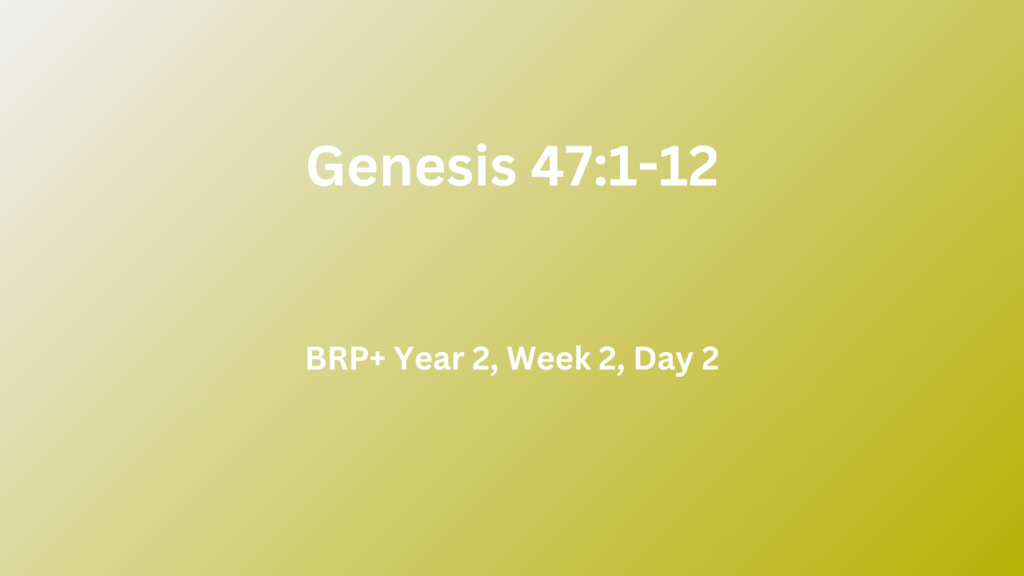Genesis 47:1-12
Q.1. Why did Joseph select five brothers to represent the rest? What was their request? How were they received by Pharaoh? What did Pharaoh want from them? – (Gen.47:1-6)
We don’t know who Joseph chose to represent the family. However, he would have wanted to make the best impression on Pharaoh. Joseph had worded his brothers up, knowing that as shepherds they would be kept separate from the Egyptians (see Gen.46:33-34). Thus, they would be able to keep a trace on their tribal ancestry throughout their generations. The brothers informed Pharaoh that they were shepherds and asked to be given permission to live in Goshen – the best in the land of Rameses (Gen.47:3-6 c.f. Gen.47:11). Pharaoh received them warmly and gave them – the best of the land … He then further asked – and if you know any capable men among them, then put them in charge of my livestock (Gen.47:6). Joseph’s brothers would be much older and would have had adult children who could shepherd the flocks.
Q.2. What surprising thing took place when Pharaoh met Jacob? How did Jacob view his life? What provision did Joseph make for his father and brothers? – (Gen.47:7-12)
Egypt was the greatest empire the world had known up to that time. Pharaoh was the undisputed head of the nations. However, it was Jacob who blessed Pharaoh (see Gen.47:7 & 10). Jacob had experienced constant conflict in his life – much of it from his own actions. His uncle, Laban had deceived him regarding his beloved Rachel, who had died during the birth of Benjamin. His wives had constantly quarreled. Then he lost his dearest son, Joseph, under tragic circumstances. He did not exaggerate to Pharaoh when he told him – The years of my sojourning are one hundred and thirty; few and unpleasant have been the years of my life … (Gen.47:9). Joseph repaid the treachery of his brothers with blessing – Joseph provided his father and his brothers and all his father’s household with food, according to their little ones (Gen.47:12 c.f. Rom.12:17-21; 1 Pet.3:8-12). He remains a powerful example of Jesus’ likeness (c.f. 1 Pet 2:21).
Q.3. Did Joseph allow the Egyptians to become socially dependent? How did he treat the religious leaders? What did the Egyptians think about Joseph? – (Gen.47:13-26)
What are we to make of Joseph’s policies during the times of famine? He had shown wisdom in leading the Egyptians to store grain during the years of plenty, thus getting ready for the coming famine (see Prov.30:24-25). As the famine struck Egypt and the surrounding nations, Joseph collected all the money and livestock, as people paid for the food from the granaries – So they brought their livestock to Joseph, and Joseph gave them food in exchange for the horses and the flocks and the herds and the donkeys; and he fed them with food in exchange for all their livestock that year (Gen.47:17). They then offered their land and themselves as slaves, in order to stay alive – So Joseph bought all the land of Egypt for Pharaoh, for every Egyptian sold his field, because the famine was severe upon them. Thus, the land became Pharaoh’s (Gen.47:20). He established a policy – At the harvest you shall give a fifth to Pharaoh, and four-fifths shall be your own for seed of the field and for your food and for those of your households and as food for your little ones (Gen.47:24). The people gratefully responded – … “You have saved our lives! Let us find favour in the sight of my lord, and we will be Pharaoh’s slaves” (Gen.47:25). The only ones not expected to pay for their grain were those who represented God. They kept the title deeds of their land and were exempted from paying taxes (see Gen.47:22 & 26). The demanding of something for the benefits provided, stopped people from using and abusing the system.
Q.4. How did Israel fare while in Egypt? Why did Jacob make Joseph promise to bury him in Canaan? What made the promise by Joseph sure? – (Gen.47:27-31)
The family of Israel thrived in Egypt and – Israel lived in the land of Egypt, in Goshen, and they acquired property in it and were fruitful and became very numerous (Gen.47:27). Just as the early church in Jerusalem was scattered after persecution, Israel too would eventually go out as a nation under the rod of slavery. As Jacob neared the end of his life – 29 … he called his son Joseph and said to him, “Please, if I have found favour in your sight, place now your hand under my thigh and deal with me in kindness and faithfulness. Please do not bury me in Egypt, 30 but when I lie down with my fathers, you shall carry me out of Egypt and bury me in their burial place.” And he said, “I will do as you have said (Gen.47:29-30). The sign of circumcision marked those under the Abrahamic Covenant. Joseph was asked to vow on that sacred covenant, that he would bury his father’s remains in Canaan, the land of promise – his sons carried him to the land of Canaan and buried him in the cave of the field of Machpelah before Mamre, which Abraham had bought along with the field for a burial site from Ephron the Hittite (see Gen.50:13). Joseph had proved himself to be a man of his word, and his solemn oath ensured he would keep his promise.

